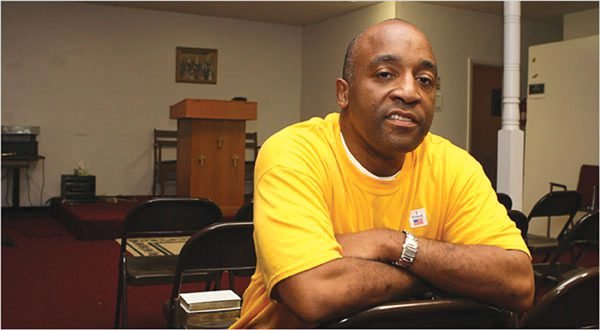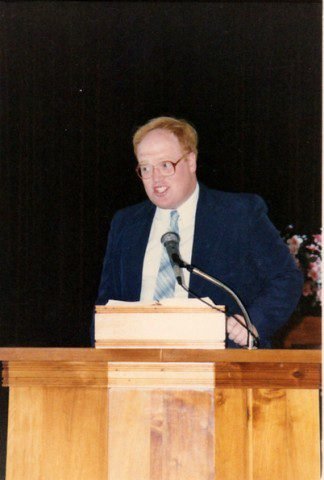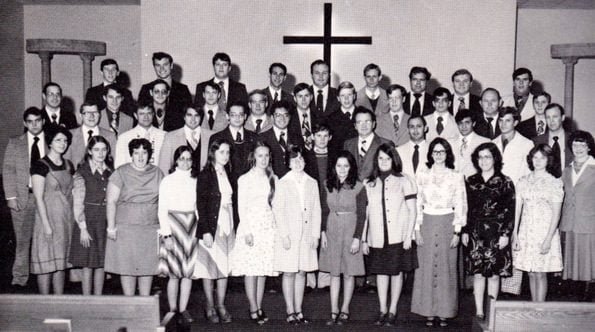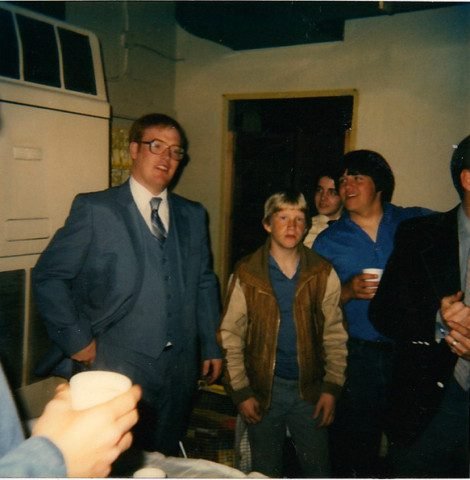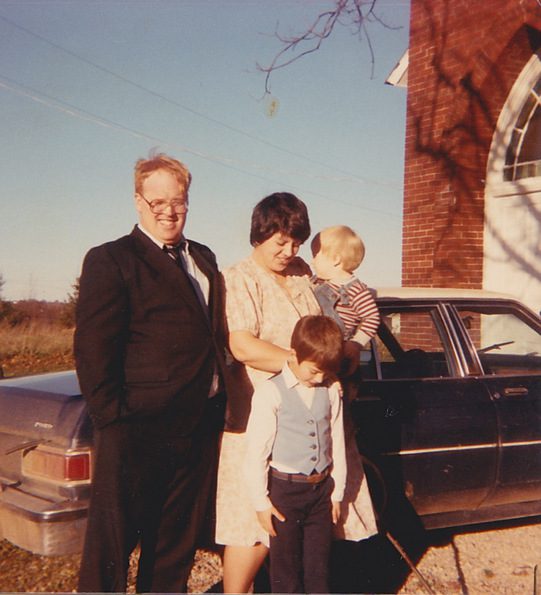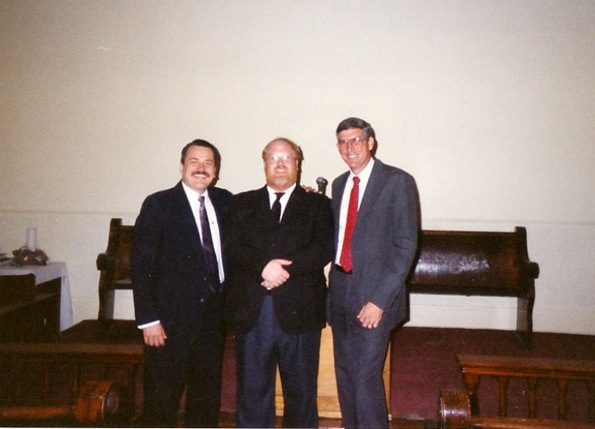
Snark ahead. If you are an easily offended Evangelical, please leave now before you feel a wedgie coming on.
Fundamentalist Nancy Campbell, blogger extraordinaire for the Above Rubies website, asks the question What Goes on in Your Home? Campbell wants to know if people “feel” the presence of God when they come into a Christian’s home:
Do the people who come into your home feel the presence of God? Are your neighbors and those around you aware that your home belongs to God?…
…How will folks know your home is truly God’s home? It will be a house of prayer. Jesus said, “My house will be called a house of prayer.” Sadly, not much prayer happens in Christian homes today, but if our home is called by God’s name it will be filled with prayer. It will be filled with confessing the name of the Lord throughout the day. It will be filled with the riches of His Word. It will be filled with joy, singing, and God-inspired music. It will be filled with the inspiration of a mother who delights to be in her home, nurturing, feeding, and training her children to be God-seekers and God-lovers.
How are people on the earth going to know the name of the Lord? When they see our homes called by the name of the Lord. When they see that He lives in our homes. Everything comes back to the family and the home. We can get involved in all kinds of ministry, but if God doesn’t fill our homes, we miss the boat. It grieves my heart to see many people serving the Lord in different organizations and yet their families are in disarray…
Campbell thinks that a Christian’s home can give off some sort of God vibe, a feeling that resonates with the person entering the home. Evangelicals are taught that they have some sort spidey sense that allows them to discern whether a person is a Christian. While their interpretation is out of context and does violence to the text, many Evangelicals think Romans 8:16 is a proof text for their Christian spidey-sense:
The Spirit itself beareth witness with our spirit, that we are the children of God
According to Evangelicals such as Campbell, a Christian should be able to walk into a home and “sense” that they are in home owned by bought by the blood, filled with the Holy Ghost, followers of J-E-S-U-S (please emphasize the word Jesus like Oral Roberts or Robert Tilton or Benny Hinn would). Here’s the problem with this kind of thinking; if the standard for a Christian home is that it exudes love, joy, peace, and kindness, well . . . I know of many homes that are like this and none of them is remotely Christian. I also know of scores of Christian homes where the pretend Christian game is on full display when other Christians are around, but as soon as their fellow believers walk out the door the home reverts to some sort of Simpsons/Girls Gone Wild/Animal House/One Flew Over the Cuckoo’s Nest home. Anyone can fake it. I guarantee you that Polly and I could, come Sunday, put on our Sunday-go-to-meeting clothes, dust off our KJV Bibles, and visit a nearby Evangelical church and everyone would think we are a wonderful Christian family; especially if we have Bethany the love magnet with us. Everyone would “sense” that we are super-duper Christians on fire for Jesus, especially once they hear Polly and I lustily sing harmonies on whatever song the band is playing. And their sense would be dead wrong.
The infallible marks of whether one is part of the Evangelical club are not some sort of seventh sense, can’t say sixth sense since six is the first number in the mark of Obama, 666. Evangelicals recognize one another by the clothes they wear, what bumper stickers are on the back of their cars, what euphemisms/cliches people use in their speech, and how much Jesus Junk® is on display in their cars, homes, and places of employment. Ask any former Evangelical, they can spot fellow believers or homeschooling families from a mile away. Polly and I can be shopping at Meijer and we will see a family in the distance and both of us will say, homeschoolers. We will then laugh, remembering that we were, for many years, THAT family.
How do you know which cars in the parking lot belong to Evangelicals? It’s the cars with a faded Ronald Reagan bumper sticker, Obama is the Anti-Christ sticker, a partially removed George W Bush bumper sticker, a Trump 2020 sticker, an Abortion Stops a Beating Heart sticker, and/or a bumper sticker that advertises what church they attend. If you look closely, you will likely see a Bible in the back window, right where it landed when it was chucked there after church last Sunday. If you don’t see it in the back window, move closer to the car, acting like you are trying to steal it, and look down at the floor. You might see a Bible stuffed under the front seat, partially covered by a McDonald’s Big Mac wrapper.
Drive by their houses and what will you see? Wind chimes with a small Christian cross as the chime ringer, a brightly colored gnome holding a sign that says Welcome! This is a Christian Home; a Jesus is Lord doormat, and out by the front of the house a sign that says Pray for the Peace of Jerusalem, A Christian Lives Here, or Protect Religious Freedom, or some other sign recently purchased from one of the fear-mongering Evangelical parachurch groups.
Once inside their homes, what will you see? Everywhere you look you’ll see Jesus kitsch, likely made by child labor in China or some third-world country. From Bible verse signs and paintings by Christian alcoholic, the late Thomas Kincade to clock chimes that play Sweet Hour of Prayer, and potholders with Christian slogans, Jesus will be on display everywhere you look. In their bookcases, you will notice deep intellectual books by Tim LaHaye, Kay Arthur, Joyce Meyer, and Beth Moore, and dusty, well-worn copies of The Prayer of Jabez and The Purpose Driven Life. (What!! Harry Potter? Starting to wonder what kind of Christian home this is.) Even in the bathroom there will be no escaping Jesus. Try as you might to defecate in peace, Jesus and the trappings of 21st-century Christianity will be staring you in the face. J-E-S-U-S is everywhere (please say Jesus in the voice mentioned above).

Visit them at their offices, what will you see? You will likely see a picture of their family sitting on the desk, but the picture will be housed in a frame that says. As For Me and My House, We Will Serve the Lord. The calendar on the wall will bear the name of the church they attend or an Evangelical parachurch group they support. Perhaps there will be a Bible or the latest Christian get-rich-quick book sitting next to the family portrait. The screen saver on their computer will have a picture of Jesus or a Bible verse. Everywhere you look you will see visible proof that the person who works in this cubicle is on Team Jesus®.
And here’s the thing, all the things I’ve mentioned in this post that are meant to say to other Evangelicals, Hey, we are on the same team, mean nothing. I suspect the home Josh Duggar grew up in had plenty of Jesus Junk®. I suspect the homes of Jimmy Swaggart, Jim Bakker, Ted Haggard, Eddie Long, Jack Hyles, Jack Schaap, David Hyles, Paula White, David Loveless, and Tullian Tchividjian, to name of few of the Evangelical pastors who have run into sexual “sin”, gave the appearance that they were devoted, spirit-filled followers of Jesus. Yet, in real life, they were fornicators, adulterers, abusers, and child molesters.
All that the Jesus Junk® tells you is that the family has enough disposable income to invest in the cheap trappings of Evangelicalism. The clothing and the outward appearance of a person tells you nothing about what kind of person they really are. Anyone can play the Evangelical game. Give me a few days and I can take a Muslim couple and turn them into Bob and Marsha Evangelical. The Evangelical shtick is easy to reproduce, so much so that anyone can do it. I correspond with closeted atheists who attend Evangelical churches every Sunday with their believing spouses. Everyone thinks the atheist is a Jesus-loving, praise-and-worship-singing Baptist. I also correspond with several closeted atheist pastors. Everything about their lives, including their demeanor, says to others, I am a follower of Jesus, Yet, if an Evangelical knew they were an atheist they would say the person is a follower of Satan.
Now, this doesn’t mean we can’t know what a person is made of. While we can never know all there is to know about a person, we can, over time, observe their life, and come to a conclusion about the kind of person they are. Here’s what Evangelicals need to understand. Non-Christians are not interested in or wowed by the consumer culture on display in your home, car, or workplace. They aren’t interested in what takes place on Sunday Morning at the church you call home. They are not interested in your Ken and Barbie pastor. What does interest them is the words you speak and your behavior, not only in public, but also when no one is looking. How do you treat your spouse, children, and grandchildren? How do you act towards minorities, the weak, the defenseless, and the marginalized? How do you treat those who are not your flavor of Christianity or vote differently than you do? How do you respond to those who have no interest in your God and have told you please don’t? What do your non-Christian coworkers say about you?
These days, when I see an Evangelical whose life is a walking billboard for the Christian Ghetto®, I immediately doubt they are what they say they are. They are trying too hard to be viewed as a Christian. They are like the car dealer who tells you he is the most honest dealer in town or the husband who tells everyone around him how faithful he is to his wife. I don’t trust those who have to publicize their virtuous character. Just live it and everyone will notice.
Bruce Gerencser, 68, lives in rural Northwest Ohio with his wife of 47 years. He and his wife have six grown children and sixteen grandchildren. Bruce pastored Evangelical churches for twenty-five years in Ohio, Texas, and Michigan. Bruce left the ministry in 2005, and in 2008 he left Christianity. Bruce is now a humanist and an atheist.
Your comments are welcome and appreciated. All first-time comments are moderated. Please read the commenting rules before commenting.
You can email Bruce via the Contact Form.
